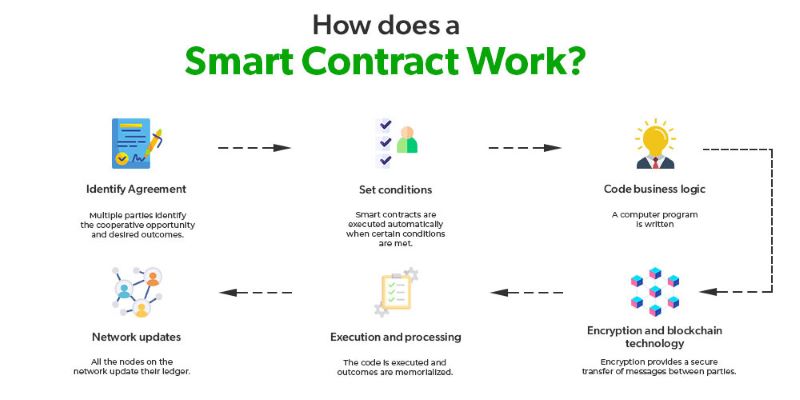Smart contracts hold the promise of revolutionizing how we conduct business, but are they truly secure and reliable? While blockchain technology offers inherent security features, smart contracts themselves can be vulnerable to errors and attacks. Join us as we delve into the complexities of smart contract security, exploring potential risks and the measures taken to ensure these self-executing agreements are trustworthy.
What are smart contracts?
Smart contracts are self-executing contracts where the terms of agreement between buyer and seller are directly written into lines of code. This code, and the agreements it contains, exist across a distributed, decentralized blockchain network. The code controls the execution of the contract, ensuring transactions are trackable and irreversible.
In simpler terms, a smart contract is like a vending machine: you input money (or other digital assets), and the machine automatically delivers the product as per the pre-programmed conditions. Smart contracts work similarly on the blockchain, automatically executing actions once the agreed-upon criteria are met.

how does a smart contract work?
Traits of Smart Contracts
Smart contracts possess unique traits that set them apart from traditional programming languages and empower them to revolutionize various technical models. These key traits include:
Transparency: Smart contracts are inherently transparent due to their deployment on public blockchains. This means that the code of a smart contract is visible to anyone with access to the blockchain, ensuring openness and accountability. This transparency allows for trust and verification, as all parties can examine the contract’s logic and execution.
Simplicity: Due to the cost associated with deploying smart contracts on the blockchain and the sensitive nature of their functions (often involving financial transactions), they are generally designed to be smaller and simpler than traditional codebases. This focus on simplicity helps to minimize potential vulnerabilities and errors.
Immutability: Once a smart contract is deployed, it is typically immutable, meaning it cannot be modified. This characteristic ensures that the contract’s code remains unchanged and its behavior is consistent over time. This immutability provides a high level of trust, as the contract acts as a reliable, unbiased third party that cannot be manipulated or altered by any single individual.
Are smart contracts secure and reliable?
Smart contracts, despite their transformative potential, are not immune to vulnerabilities. As with any software, they can contain errors and flaws that could be exploited, leading to unintended consequences or financial losses. These vulnerabilities can range from simple coding mistakes to more complex issues like reentrancy attacks, where a malicious contract repeatedly calls another before the first call is finished. Additionally, smart contracts often rely on external data sources called oracles, which, if compromised, can manipulate the contract’s outcome.

To mitigate these risks, comprehensive security measures are essential. Smart contracts should undergo thorough auditing by experts to identify and rectify potential vulnerabilities before deployment. Formal verification techniques can mathematically prove the correctness of the code, while secure coding practices and bug bounty programs incentivize developers and researchers to identify and address issues. Continuous monitoring of deployed contracts is also crucial to detect anomalies and potential attacks, allowing for timely upgrades or patches.
While blockchain technology offers inherent security benefits due to its decentralized and immutable nature, the security of smart contracts ultimately depends on the quality of their code and the robustness of the implemented security measures. By prioritizing security and adopting a proactive approach, developers and users can unlock the full potential of smart contracts while minimizing risks.
Application of smart contract
Despite their revolutionary potential, smart contracts come with inherent limitations that need to be considered. One major challenge is the immutability of their code, which makes modifications or updates difficult once deployed. This can be problematic if errors or vulnerabilities are discovered after deployment.
Additionally, smart contracts rely on external data sources called oracles, which can be susceptible to manipulation, potentially compromising the contract’s outcome.
Moreover, the legal and regulatory framework surrounding smart contracts is still evolving, creating uncertainties regarding their enforceability and jurisdiction in different jurisdictions.
Lastly, the complexity of smart contract code can make it difficult for non-technical users to understand the terms and conditions of the agreement, leading to potential misunderstandings or disputes.
The security and reliability of smart contracts remain a critical concern, especially as their adoption expands across industries. While the underlying blockchain technology offers inherent security advantages, smart contracts are only as secure as their code and the measures implemented to protect them.
By understanding the potential vulnerabilities and employing proactive security measures like thorough audits, formal verification, and continuous monitoring, we can harness the full potential of smart contracts while mitigating risks. The ongoing development of new security technologies and best practices will be crucial in ensuring the continued success and widespread adoption of this revolutionary technology.
Ready to revolutionize your forex trading with the power of smart contracts? Explore Fore X-market Solution’s cutting-edge platform and experience the benefits of secure, automated, and transparent trading.
Don’t miss out on the future of forex – start your journey with Forex Market Solutions today!